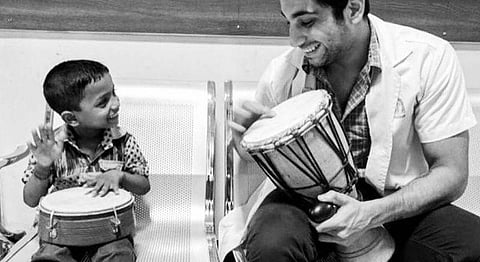
- #HGCREATORS
- #HGEXPLORE
- #HGVOICES
- #HGSHOP
- CAREERS
- ABOUT US
- CONTACT US

Every day, thousands pen their thoughts down in the form of poetry, feelings are expressed through vibrant strokes of yellow and sometimes blotches of blue, high notes are hit to get past the low points and hundreds of people lose themselves in swaying to deafening beats of music only to get away from the storm within. Creative outlets have been a way to express one’s feeling for time immemorial and now, Indian mental health professionals are taking note of this and structuring multi-modal programmes using music, dance, art, writing and other such creative forms of expression.
Samay Ajmera, 26, is one such mental health professional using music therapy to combat mental illnesses. Ajmera is a trained Music Therapist from the Mahatma Gandhi Medical College and Research Institute in Pondicherry. A certified musician from the Institute of Contemporary Music Performance, London,he has closely studied music and its impacts as an integrated health service. Through the course of his involvement with music therapy, Ajmera has witnessed the psycho-physiological benefits of music therapy on patients (with varied illnesses pertaining to cardiology, dermatology, pediatrics, palliative care, psychiatry, in the pre and postoperative departments). At present, he is based out of Mumbai and is primarily working in the field of mental health and developmental disabilities. Ajmera spoke with Homegrown about how “music therapy can uplift, transform, and positively affect the mind, body, soul.”
HG: How would you define music therapy?
Ajmera: Music Therapy is described as the clinical and evidence-based use of music and all of its elements to accomplish individualised goals within a therapeutic relationship by a credentialed professional. It is the professional use of music and its elements as an intervention in a medical, educational and everyday environment with individuals, who seek to optimise their quality of life and improve their physical, cognitive, emotional, social, communicative, intellectual and spiritual needs.
HG: Take us through your journey with music therapy?
Ajmera: Whenever I’m asked about how or when my relationship with music began, I’m unable to find an exact time or event as an answer. When I was a child I would experience stress, anger, unhappiness, conflicts of thought and interests, be it academically or on a personal level. Through all this music affected me so deeply and positively that I had to learn and know everything about it. I have always been passionate about music and the human mind since a child. In college, I wanted to study psychology but for some reason, I pursued a degree in Mass Media instead. However, the music stayed.
It was only until mid-2016 that I discovered that I could use music to connect and understand people in a more profound way through Music Therapy. This revelation took me to Pondicherry, Tamil Nadu, where I got the opportunity to study Music Therapy, under my mentor, Dr. Sumathy Sundar, at the Chennai School of Music Therapy. Through my training, I had the opportunity to work and research at the Mahatma Gandhi Medical Hospital and Research Institute on a full-time basis. Working with so many individuals experiencing physical and mental health issues, and other disabilities boosted my belief in Music Therapy as a medical intervention. I believe that’s important to not only treat the disease but the whole self. Researchers are discovering each day how one’s emotions, psychological well-being, and soul play a part in one’s physical health. Music has always been a very big part of my life and I will never forget that it has helped me through some of my darkest days, and continues to do so. To spread and return the magic of music in any way possible is the least I can do.
HG: What are the benefits of music therapy?
Ajmera: All human beings no matter their age, have innate tendencies to make and appreciate music at their own developmental level. Regardless of their age, all individuals have a basic capacity for musical expression and appreciation. Music therapy caters to people with all kinds of illness. It has the ability to improve self-esteem, alter pain perception, improve memory and cognition, reduce blood pressure and anxiety, increase orientation and provide a safe and non-judgmental environment for self-expression and communication, to name a few. Session caters to the client’s immediate needs, and the goals can change depending on the client’s progress and areas of focus. Music therapy along with other healthcare interventions like medication or psychotherapy can be extremely beneficial.
HG: How can one get involved in music therapy professionally? Are there any prerequisites?
Ajmera: To study music therapy it is essential to be a trained and qualified musician. Abroad, one must do three years of an undergraduate program and then a two-year-long masters program to be a licensed music therapist. In India, the Chennai School of Music Therapy offers a master’s program at the Mahatma Gandhi Medical College. Performing music and being a music therapist are two completely different things. I have seen a lot of performing musicians drop out of music therapy within months. To study and practice music therapy, one must be extremely motivated and have strong empathetic skills.
HG: What can one expect from a music therapy session?
Ajmera: The first session is usually an assessment of the client. I then devise a treatment plan, that determines the course of the clinical sessions according to the client’s areas of focus. My basic techniques consist of improvisation, playing of musical instruments, recreating musical experiences, composing music, verbal discussions, listening to music, music and imagery, interpreting, songwriting, musical entrainment and engaging in other activities with a musical base. My work is strictly client-centered. Long term treatment is evaluated weekly and adjusted as per the client’s immediate needs. An individual therapy session lasts up to an hour whereas a group session may go on to an hour and a half depending on the objectives.
If you liked this article, we suggest you read:
